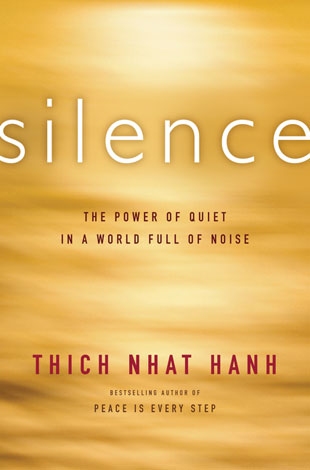"There is beauty calling to us every day, every hour, but we are rarely in a position to listen. The basic condition for us to be able to hear the call of beauty and respond to it is silence. If we don't have silence in ourselves — if our mind, our body, are full of noise — then we can't hear beauty's call." So writes Thich Nhat Hanh, the Vietnamese Buddhist Zen master, poet, scholar, and peace activist.
If you listen closely to the sounds of the world, you can hear the "Wonderful Sound" which is comprised of all the wonders of life calling you — the rain, the birds, the songs of your youth. Another sound is the "Sound of the One Who Observes the World," the path of listening. A third is the "Brahma Sound," the transcendental sound of om. The fourth is the "Sound of the Rising Tide" which symbolizes the voice of Buddha. The fifth is the "Sound that Transcends All Sounds of the World." It is the message of impermanence telling us not to get too immersed in words or sounds.
According to Thich Nhat Hanh, for those who live in cities with the constant blare and cacophony of noise, silence serves as a calming and soothing nourishment. But when these frazzled souls go on a retreat they may find silence to be scary and unsettling. In the presence of silence, we are often confronted with our restlessness, our addiction to distractions and stimuli, and our feelings of not measuring up to our own high standards.
Even more daunting is the noise of our own internal radio station, Radio NST (Non-Stop Thinking). Our thoughts of the world and our habits of negative thinking bring us down. Others may recall the strained silence of growing up in conflicted families where fear and anger filled the air and made life unbearable.
Thich Nhat Hanh heralds the healing powers of "Thundering Silence" where people practice mindful breathing and shared walking meditations. "Noble Silence" is conscious and peaceful and joyful. The more time we give to the practice of silence, the better able we are to avoid getting caught in words. Vo Ngon Thong, one of the founders of Vietnamese Zen Buddhism, wrote: "Don't ask me anything more. My essence is wordless."
The more space we give for stillness and silence, the more we have to give to ourselves and to others. This is the essence of freedom:
"Our true home is what the Buddha called the island of self, the peaceful place inside of us. Oftentimes we don't notice it's there; we don't even really know where we are, because our outer or inner environment is filled with noise. We need some quietness to find the island of self."
